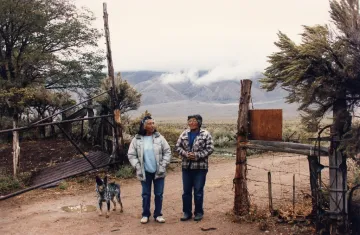
The IPLP Program worked with the Indian Law Resource Center and the Western Shoshone Defense Project to assist the Dann traditional family and other Western Shoshone groups to defend their land rights.
For over three decades, Western Shoshone grandmothers Carrie Dann and Mary Dann were at the forefront of a legal struggle over Western Shoshone territory, which extends through much of Nevada and parts of California, Idaho, and Utah. The IPLP Program worked to assist the Dann Traditional Family and other Western Shoshone groups to defend their land rights in precedent-setting proceedings before the Organization of American States' Inter-American Commission on Human Rights and the United Nations Committee on the Elimination of Racial Discrimination.
Carrie Dann of the Dann Traditional Family opposed the permit system imposed by the United States federal government for grazing cattle on large parts of Western Shoshone traditional lands. Faced with efforts by the U.S. government to forcibly stop Carrie and her sister Mary from grazing cattle and horses without a permit, the Dann sisters brought a case to federal court, challenging that the permit system contravenes Western Shoshone treaty-protected land rights. In addition to the harm against the Dann Traditional Family, the United States persistently denied other Western Shoshone people their rights to traditional lands. Simultaneously, the United States permitted non-Indigenous individuals and mining and energy companies to use and occupy Western Shoshone lands to the detriment of Western Shoshone people and their survival. Western Shoshone people were exposed to environmental damage caused by nuclear waste storage, open pit cyanide heap leach gold mining, and other industrial activities on their traditional lands.
The Dann sisters' case made it all the way to the U.S. Supreme Court, which sided with the federal government’s argument that their land rights were "extinguished" under U.S. law as a result of proceedings involving the Indian Claims Commission and the Court of Claims.
Advocacy at the Inter-American Commission on Human Rights
After exhausting domestic remedies, Carrie Dann of the Dann Traditional Family turned to the
Inter-American Commission on Human Rights (IACHR). In his capacity as Special Counsel to the Indian Law Resource Center (ILRC), Professor S. James Anaya-who served as one of the Dann sisters' attorneys before the U.S. Supreme Court-was designated as their lead counsel in the IACHR proceedings. IPLP students and staff assisted Professor Anaya and ILRC attorneys to litigate the case and achieved ground-breaking decision by the IACHR.
The IACHR issued a report condemning the United States for violating the Dann sisters' human rights. The Inter-American Commission rejected the United States' argument that its denial of continuing Western Shoshone rights was in accordance with U.S. law. The IACHR noted the inadequacy of the historical rationale for the presumed taking of Western Shoshone land-the need to encourage settlement and agricultural developments in the western United States-and also cited the United States' failure to apply the same just compensation standard ordinarily applied for the taking of property interests under U.S. law to the Western Shoshone.
Advocacy at the United Nations Committee on the Elimination of Racial Discrimination
In March of 2006, the United Nations Committee on the Elimination of Racial Discrimination (CERD) issued a decision under its Early Warning and Urgent Action Procedures urging the United States to "freeze", "desist from", and "stop" actions taken against the Western Shoshone peoples. CERD is responsible for monitoring and promoting compliance with the International Convention on the Elimination of All Forms of Racial Discrimination, a treaty ratified by the United States.
The CERD decision came after seven years of communication between the IPLP Program and CERD. Beginning in 1999, IPLP Program staff and students worked with the Indian Law Resource Center to develop and submit petitions to CERD on behalf of Western Shoshone groups, in a novel and ultimately precedent-setting use of the Committee's Early Warning and Urgent Action Procedure. This was one of the first efforts to argue Indigenous peoples' collective rights in connection with the U.N. Convention Against Discrimination and to urge intervention by CERD. This effort resulted in CERD including its published observations on the United States an unprecedented expression of concern for aspects of U.S. law that are contrary to the human rights of Indigenous peoples and of particular concern for the situation of the Western Shoshone.
The decisions by IACHR and CERD have been used as a catalyst for further initiatives before other international institutions and have aided Western Shoshone leaders in ongoing efforts to secure land rights through appeals to the federal government.
In order to promote our mission to protect and promote Indigenous peoples’ human rights, IPLP provides case archives of our advocacy projects to assist legal practitioners and advocates.
Here are resources related to our petition before the Inter-American Commission on Human Rights (IACHR) to protect the land rights of the Dann traditional family and other Western Shoshone groups.
Western Shoshone
Documents Submitted to the IACHR
Petitioners’ Supplemental Submission Brief on the Merits
Rulings by IACHR
Mary and Carrie Dann v. United States, Inter-Am. C.H.R., Case No. 11.140, Report No. 75-02
Documents Submitted to the Committee on the Elimination of Racial Discrimination (CERD)
Western Shoshone Supplemental Shadow Report
Western Shoshone Response to the US Periodic Report
Update to Second Request For Urgent Action under Early Warning Procedure
Second Request for Urgent Action under Early Warning Procedure
Request for Early Warning Measures and Urgent Procedures to CERD
Amended Request for Urgent Action under Early Warning Procedure
Rulings by CERD
